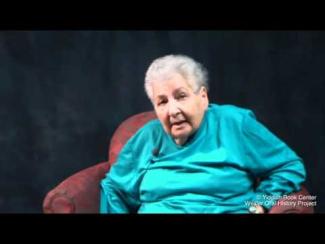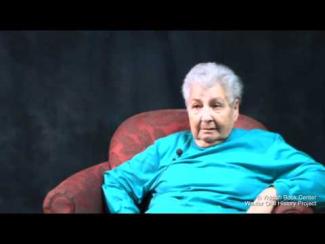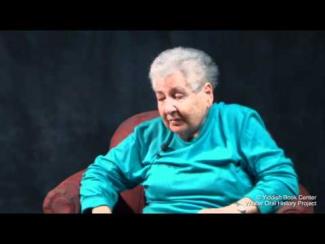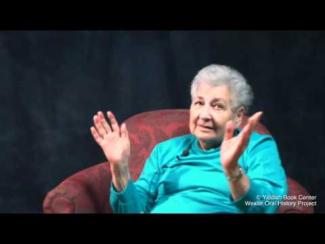The Yiddish Book Center's
Wexler Oral History Project
A growing collection of in-depth interviews with people of all ages and backgrounds, whose stories about the legacy and changing nature of Yiddish language and culture offer a rich and complex chronicle of Jewish identity.
Elaine Katz's Oral History
Elaine Katz, an 84-year old Yiddishist born in Hartford, Connecticut, was interviewed by Emma Morgenstern on November 29, 2010 at the Yiddish Book Center in Amherst, Massachusetts. An 84-year-old native of Hartford, Connecticut, Elaine was raised in a secular Jewish home with Yiddish-speaking parents. Her father was from Eastern Europe, from a religious family, but he broke from their example and announced his secular Jewish identity. He was a builder. Her mother was from Egypt and attended the French and Jewish Alliance Israelite Universelle schools there. She worked in fashion retail when she was in Egypt, and when she came to the United States, the family meeting her at the port had brought clothes because they did not want her to wear immigrant-style clothing. Little did they know that Elaine's mother would be wearing all the latest fashions of Paris! Elaine said she felt like the only secular Jewish girl in Hartford, Connecticut when she was growing up. She had the opportunity to go to Camp Wochica (Workers' Children's Camp) as a counselor. She said that experience really broadened her horizons, allowing her to meet all kinds of young and interesting people. She loved going for the three summers she worked there. Elaine went away to college at Ohio State University to study social work. She liked it very much, and said that she went the furthest from home that her parents would allow. She met her husband at Ohio State; he was in the army, stationed at (or near) the university. She had trouble dating; because of her rheumatic fever as a child, she hadn't interacted much with people her own age and thus became very nervous upon meeting new people. Just when her friends had given up on trying to set her up with someone, she met her husband in the Hillel House. She was bored that day, so decided to go over to Hillel; she didn't think anyone was actually in the building, until she heard a record playing of Jewish partisan music from Europe. She found three soldiers playing the record, and when she talked to her future husband, Lyber, she realized she knew both his cousin and his father, the writer Moishe Katz. Moishe Katz visited Hartford to give lectures and he would stay at Elaine's house. Elaine and Lyber dated for a few weeks, until school vacation started; during vacation, Lyber was shipped out. They kept in sporadic contact over the next few years, until Lyber came back from the war and looked Elaine up. Elaine moved to New York after college and has lived there ever since. Elaine and her husband were involved in the Jewish Young Fraternalists, which was part of the Jewish People's Fraternal Order. It was basically the youth movement that was involved in offering courses and musical performances: all kinds of social and political events. Elaine remembered the musical director, Bob Decormier, who was not Jewish but a stickler for making music as authentic as possible. One time, Bob was trying to teach someone the name of a song he was to announce at a performance, and the person could not say "shvet" correctly. Music is important in Elaine's life, but she insisted, like she did about many other parts of her life, that this was just what people did. She likes music relating to workers' struggles, fitting in with the way she was brought up and her other political/social affiliations. Elaine was involved in a shule, a once-a-week school in Yiddish language and history, near her apartment in New York. Her children attended the school and she eventually led it for eleven years. She said the shule only had about ten children at any given time, with one or two teachers. The aim was to make the children feel comfortable speaking Yiddish and to understand where they came from/what their roots were. There was some difference in opinion between the teachers, who wanted to correct the children's Yiddish mistakes, and the shule's mission of keeping the children comfortable in the language. Elaine and her husband have traveled around the world, to countries including China, New Zealand, Australia, Tunisia, parts of southern Africa, and parts of Europe. They tried to find the Jewish sites and Holocaust museums wherever they traveled, and she said some of them were very unusual, varying in their attitudes about the Jewish past and future. Elaine currently participates in a Yiddish shmooze group, which involved Bella Gottesman (a famous Yiddish poet). She became involved when her daughter-in-law informed her that she would be raising their children in Yiddish. Elaine says her Yiddish has improved immensely since joining. Elaine advised future generations to simply live and not make such a fuss about every single thing they are doing. She wants future generations to live for their own children and the generations of their futures.
This interview was conducted in English.
Elaine Katz was born in Hartford, Connecticut in 1926. Elaine died in 2015.






